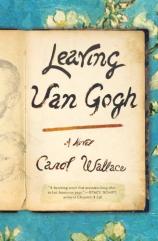Leaving Van Gogh
Review
Leaving Van Gogh
A fair amount is known about troubled artist Vincent van Gogh
through his portrayals in movies like Lust for Life with
Kirk Douglas and Robert Altman's Vincent & Theo, and
even in song, as in Don McLean's "Vincent." Much has been
mythologized --- his cutting off his ear for a woman he loved, for
example, when in actuality, it was part of his ear lobe and for a
prostitute he knew. Most people are aware that his young, turbulent
life ended in suicide. But little is known about Dr. Paul Gachet,
his trusted physician and the subject of one of his portraits.
Carol Wallace's well-researched novel attempts to demystify the
good doctor as well as give keener insight into the mind of a
tortured artist.
van Gogh's family has artistic leanings, but ones that lean more
into the business of art, as several of his uncles and his own
beloved brother, Theo, pursue careers as art dealers. After having
little success at that, van Gogh follows his father's career path
as a minister, but this doesn't last long and leaves the young
Dutchman an atheist. Finally, he turns all of his frenetic energy
toward being an artist. Although he does not have much financial
success at it, it seems to be the best fit with his temperament.
His ever-loyal brother keeps him in pocket money and canvases ---
whatever is required so that he can pursue his painting.
But van Gogh's behavior has gone from eccentric to dangerous,
and Theo, with his own young family at home to worry about, isn't
able to give his brother the supervision and support he needs. Theo
engages the services of Dr. Paul Gachet, who has great experience
and success working in mental asylums and with hysterics. Gachet,
unlike the other doctors van Gogh had been treated by before,
insists that he keep up with his painting, assuming quite astutely,
"If I understand you at all, Monsieur van Gogh, your painting is
the reason you continue to live, is it not?" Gachet's practice is
in his home in Auvers, northwest of Paris, where he lives with his
21-year-old daughter, Marguerite, and 17-year-old son Paul, his
wife having died of consumption some 15 years earlier. van Gogh is
living in a room in a nearby inn and coming by daily for visits
with Gachet. It isn't long before he is a fixture in their
household.
Gachet can relate to the brooding artist's sense of malaise and
melancholy, although he knows van Gogh can be prone to fits of
anger and violence that come out of nowhere: "For all my experience
as a man and as a doctor, I knew I could not quite imagine his
predicament. I am a sympathetic man. I have known melancholy and a
kind of panic-stricken grief when it seemed that to exist for a
moment longer was beyond what a man could endure....what must it be
like, to know yourself untrustworthy, to have something take over
your free will....But most of us stumbling through life do no bear
the burden of knowing that we may turn into monsters."
Gachet, a novice painter himself, is in awe of van Gogh's
uncanny ability "to create haunting images that reached the heart
of the viewer. That was his astounding gift to the world." In
addition to their love of art, they each possesses mutual
admiration for the other. The doctor also greatly admires the
loyalty and camaraderie between van Gogh and his brother: "There
was a rapport between them that you rarely see between men. It was
as if, rather than living apart for the previous years, they had
been in the same room. They spoke as if they knew the same things,
had had the same experiences." But, as had happened in the past,
van Gogh's illness rears its head with violent results, and the
good doctor is left to make sense of it all.
After writing several middle-grade novels, this is Carol
Wallace's adult fiction debut. And what an ambitious first effort
it is. The language is at once beautiful and accessible, and the
reader is drawn immediately into the story. Similar to recent works
like LOVING FRANK and THE PARIS WIFE, LEAVING VAN GOGH provides an
interesting and different vantage point of a well-known figure.
Reviewed by Bronwyn Miller on April 25, 2011
Leaving Van Gogh
- Publication Date: April 19, 2011
- Genres: Fiction, Historical Fiction
- Hardcover: 288 pages
- Publisher: Spiegel & Grau
- ISBN-10: 1400068797
- ISBN-13: 9781400068791





